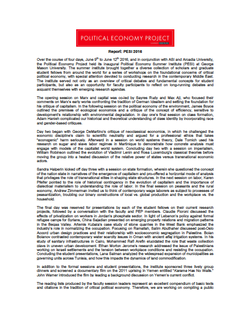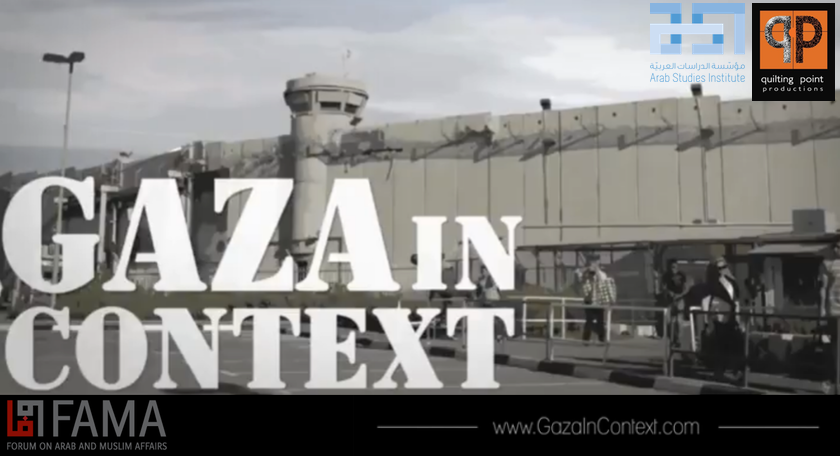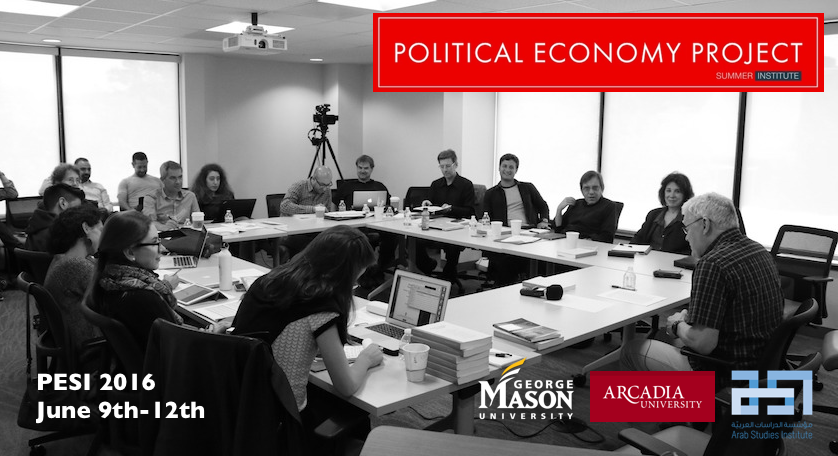- FAMA
- Researchers
-
Projects
- MESPI
- Knowledge Production Project >
-
Political Economy Project
>
- Development and the Uprisings
- Class Formations and Dynamics
- The Palestinian Economy: Fragmentation and Colonization
- Tunisia: A Political Economy in Transition
- Migrant States, Mobile Economies: Rethinking the Political in Contemporary Turkey
- Political Economy of the Middle East: Continuities & Discontinuities in Teaching & Research
- 2016 Political Economy Institute
- The Lebanon Project >
- The Palestine Project >
- The Civil Society Project >
- Middle East Media Project >
- The Egypt Project >
- Refugees and Migrants Project >
- Black-Palestinian Transnational Solidarities Project
- Initiatives
- Events
- Summer Institutes
- Internships
- Blog
|
Contact: Tamar Ghabin | [email protected] | (610) 324-7203
Arab Studies Institute Releases Pedagogical Project Re the Gaza Strip, Gaza in Context July 2016 – Washington, DC - Israel does not have a Hamas problem, it does not have a Gaza problem, it has a Palestine problem. It has been two years since one of Israel’s most brutal attacks on the Palestinian people of Gaza in its history. Despite overwhelming evidence of the disparity of power between Israel and all Palestinians and the aggressiveness of Israel's exercise of its power, including excessive and brutal violence and collective punishment in Gaza in the form of occupation, siege, and frequent military assaults against dense and captive civilian populations, mainstream media and educational materials continue to frame Israel as the victim. This pedagogical project aims to correct the propagandistic character of mainstream media and educational coverage. Gaza in Context provides historical context, explaining Palestinian resistance, for what has been an Israeli narrative that exceptionalizes Gaza and removes it from the larger Palestinian struggle. This is an opportunity to understand the violence and Israel’s settler-colonial project. In practice, Israel has adopted intermittent, counterinsurgency campaigns aimed at diminishing the capacity of the captive Palestinian population to militarily resist Israel’s structural violence. Conceptually, it has set Gaza apart from the rest of the Palestinian-Israel conflict so that there is no continuity between Israel’s wars waged upon it and its treatment of Palestinians throughout Israel as well as the West Bank, including East Jerusalem. Together, the practice of systematic war and the framework of unique distinction have set the Gaza Strip apart from the question of Palestine and transformed it into a national security question. By emphasizing the role of Hamas and diminishing the question of Palestine, Israel has collapsed conditions in Gaza with asymmetric conflicts, or what has come to be known as the “global war on terror,” thus eliding the consequential distinctions between Palestinians and other non-state actors. This pedagogical project is an attempt to re-frame the issue in order to place greater emphasis on the broader question of Palestine and to explain Israel’s policy towards the Gaza Strip in that context. A 20-minute multi-media film that combines lecture, animation, typography, and footage from Palestine is the centerpiece of the project. Its other components include a teaching guide for instructional purposes, a bibliography for research purposes, and a compendium of Jadaliyya articles featured in what we call a JadMag. All of these elements are housed on the project’s own website, which is part of a larger research project on Palestine headed by the Forum on Arab and Muslim Affairs at the Arab Studies Institute. This interdisciplinary pedagogical project aims to resituate the question of Gaza within a broader Israeli settler-colonial framework, and it uses Israel’s most recent military onslaught, Operation Protective Edge, to do so. The release of this project coincides with the two-year anniversary of the brutal operation and aims to use the war as a teaching moment to counter Israel’s ahistorical claims that saturated the media. Gaza In Context seeks to provide an assertive framework for understanding Israel’s systemic attacks as part of the larger question of Palestine. Operation Protective Edge, and any past or future Israeli onslaughts, should be read within this framework in order to highlight the abnormality of the Palestinian condition and to realize a viable and just alternative. Who We Are We are a group of academics, activists, and artists seeking to shift the narrative around the Gaza Strip and Palestine, in general. This is an Arab Studies Institute project and is one component of its Palestine Project housed by the Forum on Muslim and Arab Affairs. Who We Want to Reach As a pedagogical project we hope that educators, in high school and college classrooms, as well as organizers and activists use these resources to interrogate the conditions in Gaza and use them as a point of departure for understanding the question of Palestine. The History of the Project The idea for Gaza in Context emerged during the summer of 2014 when Israel launched its most devastating offensive on the besieged Palestinian population of the Gaza Strip to date. Despite the immense destruction wrought upon a captive population Israel successfully claimed victimhood in western media as it launched 6,000 airstrikes and 50,000 artillery shells in an air and ground offensive that lasted for 51-days. The course of the media cycle made evident the need for an assertive framework to explain Israel’s systematic wars. Specifically, to counter its defensive claims and situate its aggression within a broader settler-colonial project in Palestine. See what people are saying about Gaza in Context: "Gaza in Context is a superb film accompanied by an excellent teaching guide with seminal articles on the various aspects of the subject, discussion questions, reading list and bibliography. Not only does the 20- minute- film provide the essential facts necessary for an understanding of the problem it helps the viewer understand the context, history and nature of the Israeli policy that brought the Gaza Strip to where it is today. It does this without committing the common error of treating Gaza in isolation from the rest of Palestine but helps explain the consistency in the Israeli policy over the years and throughout Palestine while focusing on its implications and manifestations for Gaza. The film ends with a cri de Coeur to all of us to do what we can to bring an end to what the film convincingly argues is not a natural but a human-made disaster, and save Gaza from continuing to be a zone of death."-- Raja Shehadeh, Palestinian lawyer, novelist, political activist, affiliate of the International Commission of Jurists, and a founder of the human rights organization Al-Haq. "Gaza in Context is a fantastic educational instrument, conveying in 20 minutes what it would take most people a lifetime to learn. It gives an accurate and visually brilliant portrayal of the tragedy that has befallen not only Gaza, but the entire Palestinian people."--Dr. Richard Falk, Professor Emeritus of International law, Princeton University, former United Nations Special Rapporteur to the Occupied Palestinian Territories. "I did not think it was possible to examine in 20 minutes what Gaza in Context does with such compelling clarity: Israeli policies toward Gaza and Palestine, which are inseparable; the core problems affecting Gaza and the deliberateness of the policies that have led to Gaza's disablement; Gaza's centrality in the Israeli-Palestinian conflict; and some common myths surrounding Gaza and the history of the conflict overall, which are straightforwardly debunked. An immensely valuable teaching tool, the film's power also lies in its fundamental humanity, a heartfelt entreaty to end the oppression and violence so that all people in this tortured part of the world may aspire to a future in which their children can flourish."--Dr. Sara Roy, senior research scholar at the Center for Middle Eastern Studies, co-chair of the Middle East Seminar, and co-chair of the Middle East Forum at the Center for Middle Eastern Studies. "Israel's deliberate fragmentation of the Palestinian people and their land for the past 70 years has also fragmented the Palestinian narrative and struggle for rights. This is just one reason why it is vital that efforts to stop and reverse Israel's colonization project adopt a holistic framework of analysis. Gaza in Context does just that: It zeroes in on Israel's repeated assaults against the besieged strip but then broadens out to show how Israel's attacks on Gaza are part of a consistent plan against the entire Palestinian people, a plan that from day one has sought to minimize the number of Palestinians in historic Palestine and maximize the number of Israeli Jews. The 20-minute film and accompanying educational materials succinctly provide the missing context in so many accounts of the conflict. It is an excellent entry point for the many thousands who are beginning to support Palestinian rights and an important refresher for others that have been involved in the movement for longer. Spread the word!" --Nadia Hijab, Executive Director, Al-Shabaka: The Palestinian Policy Network "Gaza in Context is an excellent educational resource that places Israel’s ongoing attacks on Palestinians in Gaza in their proper political context, that of settler colonialism, resistance to such colonialism and the Palestinian struggle to stay alive. In 20 minutes, this film debunks many of the Israeli-perpetuated myths — myths that have been conveniently adopted by others — by focusing on facts. The various articles and discussion questions accompanying the film serve as essential tools for those wishing to learn more."-- Diana Buttu, Palestinian lawyer, analyst and former advisor to the PLO. “Gaza in Context should be required viewing for everyone, including those familiar with the situation in Palestine. Powerful, informative, and persuasive, Noura Erakat delivers a fusillade of facts with concision and passion, obliterating in twenty minutes some three decades of media misinformation about Israel’s occupation of Palestine. An effective teaching tool, irrespective of one’s political position."-- Robin D. G. Kelley, Professor of History and African American Studies, UCLA
0 Comments
 Over the course of four days, June 9th to June 12th 2016, and in conjunction with ASI and Arcadia University, the Political Economy Project held its inaugural Political Economy Summer Institute (PESI) at George Mason University. The summer institute brought together a diverse collection of scholars and graduate student fellows from around the world for a series of workshops on the foundational concerns of critical political economy, with special attention devoted to conducting research in the contemporary Middle East. The institute served not only as an overview of critical debates and fundamental concepts for student participants, but also as an opportunity for faculty participants to reflect on long-running debates and acquaint themselves with emerging research agendas. The opening session on Marx and capital was co-led by Sayres Rudy and Max Ajl, who focused their comments on Marx’s early works confronting the tradition of German Idealism and setting the foundation for his critique of capitalism. In the following session on the political economy of the environment, James Boyce outlined the premises of ecological economics and a critique of the concept of efficiency, sensitive to development’s relationship with environmental degradation. In day one’s final session on class formation, Adam Hanieh complicated our historical and theoretical understanding of class identity by incorporating race and gender-based critiques. Day two began with George DeMartino’s critique of neoclassical economics, in which he challenged the economic discipline’s claim to scientific neutrality and argued for a professional ethics that takes “econogenic” harm seriously. Afterward in a session on world systems theory, Dale Tomich used his research on sugar and slave labor regimes in Martinique to demonstrate how concrete analysis must engage with models of the capitalist world system. Concluding day two with a session on imperialism, William Robinson outlined the evolution of Vladimir Lenin and Rosa Luxemburg’s classical theories before moving the group into a heated discussion of the relative power of states versus transnational economic actors. Sandra Halperin kicked off day three with a session on state formation, wherein she questioned the concept of the nation state in narratives of the emergence of capitalism and pro-offered a horizontal mode of analysis that privileges the role of transnational elites in shaping state structures. In the next session on labor, Karen Pfeifer pointed to the role of historical contingency in the evolution of capitalism and the importance of dialectical materialism to understanding the role of labor. In the final session on peasants and the rural economy, Andrew Zimmerman invited us to think of contemporary wage laborers as subject to processes of peasantization, troubling our binary constructions of local vs. global production and the workplace vs. the household. The final day was reserved for presentations by each of the student fellows on their current research projects, followed by a conversation with the faculty and PEP members. Claudie Fioroni discussed the effects of privatization on workers in Jordan’s phosphate sector. In light of Lebanon’s policy against formal refugee camps for Syrians, China Sajadian presented on emerging property relations and migration patterns in the Beqaa Valley. Artemis Kubala’s case study of stone quarries in the West Bank emphasized the industry’s role in normalizing the occupation. Focusing on Ramallah, Salim Abuthaher discussed post-Oslo Accord urban design practices and their relationship with socioeconomic segregation in Palestine. Boian Boianov contrasted contemporary water scarcity issues in Oman with ancient aflaj irrigation systems. In his study of sanitary infrastructures in Cairo, Mohammed Rafi Arefin elucidated the role that waste collection plays in uneven urban development. Ethan Morton Jerome’s research addressed the issue of Palestinians working on Israeli settlements and the tension between workplace conditions and resisting the occupation. Concluding the student presentations, Lana Salman analyzed the widespread expansion of municipalities as governing units across Tunisia, and how this impacts the dynamics of land commodification. In addition to the formal sessions and student presentations, the institute sponsored three lively group dinners and screened a documentary film on the 2011 uprising in Yemen entitled “Karama Has No Walls.” John Warner introduced the film by leading a background discussion on Yemen’s current conflict. The reading lists produced by the faculty session leaders represent an excellent compendium of basic texts and citations in the tradition of critical political economy. Therefore, we are working on compiling a public PESI reading list in coordination with PEP’s annotated bibliography project. Looking forward, we are collecting feedback from this year’s participants and have already started planning for the 2017 workshop. Overall, the inaugural Political Economy Summer Institute was an overwhelming success.
|
Forum on Muslim and Arab AffairsFAMA is the research arm of the Arab Studies Institute. Archives
June 2017
Categories |
- FAMA
- Researchers
-
Projects
- MESPI
- Knowledge Production Project >
-
Political Economy Project
>
- Development and the Uprisings
- Class Formations and Dynamics
- The Palestinian Economy: Fragmentation and Colonization
- Tunisia: A Political Economy in Transition
- Migrant States, Mobile Economies: Rethinking the Political in Contemporary Turkey
- Political Economy of the Middle East: Continuities & Discontinuities in Teaching & Research
- 2016 Political Economy Institute
- The Lebanon Project >
- The Palestine Project >
- The Civil Society Project >
- Middle East Media Project >
- The Egypt Project >
- Refugees and Migrants Project >
- Black-Palestinian Transnational Solidarities Project
- Initiatives
- Events
- Summer Institutes
- Internships
- Blog




 RSS Feed
RSS Feed
